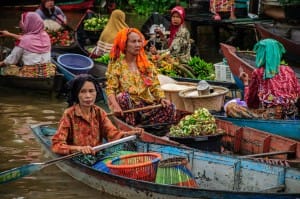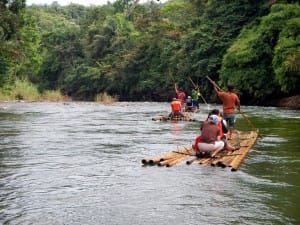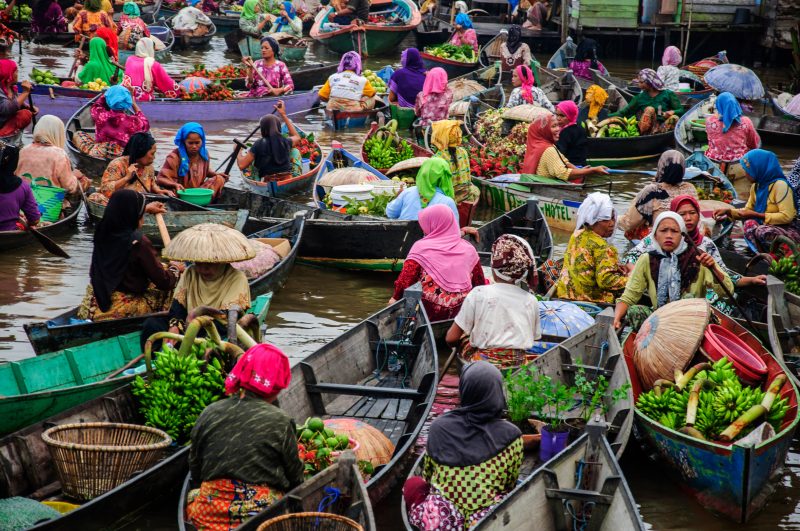Any discourse on the rivers of Indonesia owes a great debt to Kalimantan. The world’s third-largest island is home to three of the longest rivers in Indonesia: the Kapuas (West Kalimantan), the Mahakam (East Kalimantan) and the Barito (South Kalimantan). No wonder Kalimantan’s people rely heavily on the abundance of waterways, both as a means of transport and a source of livelihood.
Recently I visited South Kalimantan province to explore the wonders of the Lok Baintan Floating Market in Banjar Regency, as well as the beautiful scenery in the heights of the Maratus Mountains in Loksado District.
The beauty of these places would be nothing without the existence of the rivers and the lifeblood they provide.
Lok Baintan Floating Market: a 500-year-old legacy
A ‘floating’ market is a market held on a river or waterway, usually using traditional boats. This type of market is also found in neighbouring countries such as Thailand and Vietnam. In Indonesia the most prominent, authentic floating markets are the Muara Kuin, downstream of the Kuin River in Banjarmasin, and the Lok Baintan on the Martapura River in Banjar. Both are in South Kalimantan province. It is a privilege to witness this ancient trade in action, as it dates back to the reign of the Banjar Sultanate (c.1520). Modernisation threatens its future, though on my visit I heard the local government is now willing to make the effort to support and preserve the tradition.


What I found most intriguing were the countless exotic fruits on sale, including some rarely seen or sold in big cities nowadays. One example is the Kalimantan mango or kasturi (Mangifera casturi) which is on the International Union for Conservation of Nature (IUCN) Red List of Threatened Species. It tastes similar to an ordinary mango, but softer and with less flesh. Others are the rambai (Baccaurea motleyana), a bit like longan and similar to another rare fruit, the menteng. There is also duku fruit, known as langsat or lanzones, the latter of which is more common in Indonesia.
Chaos is perhaps one’s initial impression of the Lok Baintan Floating Market. It can seem haphazard, with nudges and bumps between boats often occurring. But observe closely and you’ll see it is actually very orderly and tolerant. In this market the traders respect one another: the bumps are inevitable and indeed necessary for them to communicate and even to trade with one another. Uniquely, they often do not use money for trade, but instead do business by barter system; trading one item for another.
After traversing the Lok Baintan Floating Market shortly before closing time, I tasted one of Banjar’s culinary wonders, Soto Banjar. The common soto is found all over Indonesia and is usually composed of broth, meat and vegetables. This one was in a traditionally Banjarese style: shredded chicken, egg, potatoes and carrots, served with lontong (packed rice in leaves).
Wading through the Amandit River in Loksado
From my hotel in Banjarmasin I headed out to Loksado, around four hours away. Loksado District is in the Hulu Sungai Selatan Regency. The route from Banjarmasin was via Martapura, Rantau, Kandangan and on to Loksado. Martapura is a producer of diamonds and other valuable mineral rocks, but it is also the centre for clerical Muslim schools in Kalimantan. Leaving Martapura I encountered Rantau, a producer of coal, passing several mines and large trucks. After Kandangan the road started to escalate in twist and turns: the start of the road to Loksado, up in the highlands of the Maratus Mountains and home to the Dayak Maratus tribes.


Rafting here is different to the usual safety get-ups and high-tech boats found elsewhere. These are simply plain yet sturdy bamboo logs tied together into a long raft. It may look frightening at first but it is actually pretty stable! It helps that the rapids in the Amandit River are not as strong as others used for more heavy-duty rafting. Indeed you don’t get too wet – perhaps just from the waist down. The journey was about 90 minutes with stops for picking local fruits from trees along the riverbanks.
Visiting the Lok Baintan Floating Market and then partaking in Loksado’s bamboo rafting are unique experiences, but still relaxed and not too tiring. Perfect for a quick getaway or weekend trip.
—
FAST FACTS
Country: Indonesia
Province: Kalimantan Selatan (South Kalimantan)
Land areas: Banjar regency – 4,668 km2. Hulu Sungai Selatan Regency – 1,703 km2
Largest cities: Martapura Kadangan
Top tips:
- Fly in the afternoon or at night to Banjarmasin and stay for one night.
- Use a charter or rented car and boat (plus a local guide) to take you to the Lok Baintan Floating Market. Get up for dawn and get there early.
- Rent a car that has experience of driving guests the four hours to Loksado. I stayed at the Mountain Maratus Resort, Desa Loklahung. Email: [email protected]




